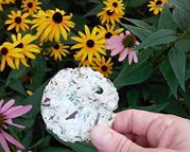top of page
MADE BY SPECIAL ORDER -email diane@echotopia.org
Echotopia's Native Seed Rounds - 2" Diameter Paper Discs Embedded with Seeds

What's in your Seed Round?
Natives are host plants to a range of butterflies and their flowers also provide nectar!
What to look for when Seed Round plants start to germinate:
Echotopia's FB album for identifying what's germinating: CLICK HERE
Links to native flower perennials (some may appear on their own in your garden!
Black-eyed Susan Echinacea (or Purple Cone Flower) Butterfly Weed Wild Petunia
Common Milkweed Blue Aster Goldenrod Daisy Fleabane Bee Balm Wild Blue Indigo Lobelia
Links to beneficial annuals
Sunflowers, Marigolds, Cosmos & Zinnias may also bring delight by self seeding.
Planting Seed Rounds
Remember to shred and spread the Seed Rounds so the seeds are not too close together. Small gardens are fine, and full sun/healthy soil is best. Plant in the growing season, an inch into soil. Water regularly, if needed, until germination. Be ready to transplant and weed plants. Many vital plants self spread through the years - hosting & feeding pollinators - once they’re established.
Be patient, and expect surprises - natural systems are always surprising. Native seeds can require a year or more to germinate. Annuals, such as Zinnias, Cosmos or Marigolds, may germinate and feed pollinators within weeks, if planted late spring through July. They may also self seed in future years. You will need to weed, perhaps redistribute, and nurture your native flowers. Some natives, like Butterfly Weed and Wild Blue Indigo, are actually bushes. Others, like Aster and Goldenrod, like to spread and compete tho they are necessary and glorious together. Red Bee Balm and Common Milkweed like to spread and compete. Eventually, you may want to harvest & save your flower seeds and share your seeds too.
Why Echotopia Seed Rounds? Because. Beauty. Biodiversity. Regeneration. Reciprocity.
At Echotopia, building biodiversity is a central feature of our social enterprise. Small wildlife gardens - such as thousands in cities like Baltimore - are desperately needed throughout the Mid-Atlantic to reverse species decline of endangered area Bees, Monarch Butterflies and other pollinators. These creatures help sustain all life in our shared food web. Our small garden contains many plants who make thousands of seeds yearly. It is commonsense to honor Earth's abundance and share her gifts via Echotopia's Seed Rounds. Thus we partner with others to build biodiversity: to host and feed Songbirds, Hummingbirds, Butterflies, Honey Bees and other pollinators. Our Seed Rounds have a role in educating market friends, but also in multiplying local ecosystem regeneration, restoration, and reciprocity. Once wildflower gardens are established, the wind, creatures, and even Echotopia customers and friends share or spread abundant native wildflower seeds - through the seasons and years. Human reciprocity with nature requires multi year patience, observation, flexibility, experimenting, resourcefulness and determination. And the gifts that accompany native gardening expand exponentially well beyond our initial efforts.
"Why is the world so beautiful?" Inspiring Resources
The Intelligence in All Kinds of Life On Being podcast with Robin Wall Kimmerer
The Honorable Harvest video featuring Robin Wall Kimmerer
More Than Just a Pollinator Garden
The Benefits of Growing Wildflowers
How to Fight Climate Change in Your Own Garden
Saving & Sharing Native Seeds (more links to come!)
Mouse Eared Coreopsis
 |  |
|---|---|
 Seed round close up |  |
 |  |
 |  |
 |  |
 |  |
 |


















bottom of page